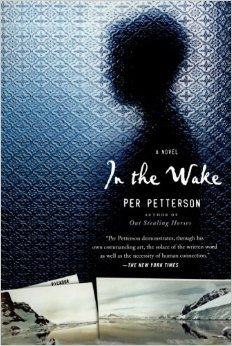Editor’s Note: As we approach our tenth year of publishing Fiction Writers Review, we’ve decided to curate a series of “From the Archives” posts that we’ll re-publish each week or so during 2017. Some of these features are editor favorites, some tie in with a new book out from an author whose work we’ve covered in the past, and some are first conversations with debut authors who are now household names.
This week we’ve returned to Brad Felver’s craft essay “Against Cleverness,” which was originally published on June 10 of 2013. Because the work of George Saunders features in this essay, we thought this a timely post to republish. Saunders’s newest, Lincoln in the Bardo, was just released last week by Random House.
I adore tongue-tied characters: the inarticulate ones who start sentences but can’t quite finish them; the ones who vomit up thoughts that seem to circumnavigate the globe before arriving at a point, which is still not very clear; the characters who stammer and say, “goddammit, never mind then” and stomp off to drink moonshine or hunt grizzly bears. There’s nothing sexy about this dialogue or narration, no gimmickry, no pyrotechnics. Depicting such inarticulate speech patterns in fiction should be easy, right? Somehow, it isn’t—but it’s necessary, because humans are generally an inarticulate bunch.
For example, Jack Boughton, the center of gravity in Marilynne Robinson’s novel Home (Farrar, Straus and Giroux, 2008) is the tortured prodigal son who returns to Iowa after years away. He tries to explain his absence to his sister Glory:
“When Mama died I’d been out of jail for a couple days. So I could have come home. Strictly speaking. But it takes a while to shake that off, you know. Wash it off. To feel you could blend in with the Presbyterians.”
Glory said, “You don’t have to tell me anything you don’t want to. Not that it matters. I don’t care if you’ve been in jail.”
Moments later, after Glory suggests Jack go sleep off his hangover, Jack responds:
“Yes,” he said, “I’ll do that. Thanks.” He stopped halfway up the stairs. “I told you a minute ago that I was in jail. I should have said prison. I was in prison.”
Jack starts and halts his way toward his admission, says “you know” in hope of not having to say it himself, begins walking away, circles back around, and finally lands on it. The reader gets the feeling that everything that came before this confession was a wind-up in which Jack gathered strength. And yet when he does finally reach it, he repeats it. He says that word, prison, twice, as if the first time is to come clean and the second is to punish himself. Robinson captures not only the external speech patterns of a conflicted man, but she also loads each line of dialogue with levels of meaning that reveal Jack’s motivations. For Jack, there is always a gulf between what he says and what he means, not necessarily because he is cagey, but because he can’t seem to locate the proper words in time. Worse, the gulf is not a wide one. He can see the other side, and so he leaps across but fails. The reader recognizes this pattern, but Jack does not.
Per Petterson, the Norwegian writer who rose to international fame with his fine novel Out Stealing Horses (Graywolf, 2007), likewise manages the mumbler with authority. Arvid Jansen, a character who recurs throughout Petterson’s work, stumbles from word to word as if he was born with drunken vocal chords. In In the Wake (Picador, 2007), we see Arvid’s character through his realistic and inarticulate speech and also in Arvid’s first-person narration:
The cup is half full. The coffee has gone cold. I don’t know what I’ve been doing. It is still dark, it is still winter, there’s a cold draught from the balcony door. In the next block Mrs. Grinde has put on her kitchen light again. It has been off for a while. I look at the clock. It says four. What is she doing up now, there’s no-one to spy on except me, and I’m not that interesting, or maybe I am, to her, and I picture her even though I have only seen her out of doors, on the way to the bus or at the Co-op; the stern eyes behind her glasses, her small body restlessly passing from room to room, one lit, one dark, then one lit again, in her dressing gown maybe, her brown hair gathered at the neck in a rubber band, and the binoculars on the window sill.
Here we are able to watch Arvid uncover his own thoughts as he speaks. He doesn’t know what he means at the beginning of a paragraph, but he has often realized it by the end. He starts by noticing the external world, and he slowly internalizes it, changing his mind mid-sentence, thinking in halting and staccato rhythms. He eventually ends up not merely processing the nuances of the world, but inventing new ones. Because the reader gets to watch him create Mrs. Grinde right in front of us, we witness the confluence of uncertainty and discovery. His pace even quickens as the paragraph proceeds. Arvid is like a locomotive that heaves from stop, churns to life, slowly building momentum, and eventually requires a long stretch to halt.
This certainly resembles how the world unfolds for me: at first it makes little sense, but I snap the puzzle together, slowly, inventing pieces where they are absent, and I end up not so much with a completed puzzle but the theory of one that I have convinced myself is accurate. Arvid stumbles his way toward understanding the world—even his internal voice is clumsy—and I suspect many of us feel much the same way.
 I should come clean here and admit that I realized my own love of the inarticulate character not by reading Robinson or Petterson, but instead by reading the opposite—hundreds of stories populated with characters who toss about throbbing verbs and fierce retorts, always perfectly pitched, perfectly timed. Narrators who are so articulate they seem to have their own separate speech writers. An endless supply of banter, of characters plunging forward with their miniature soliloquies. In my tenure as fiction editor of a magazine that received thousands of story submissions each year, I grew tired of the relentless cleverness, which very often was at the expense of plot and character and style. Frequently, little happens in such stories beyond characters trying to out-clever each other, as if they all moonlight as stand-up comics.
I should come clean here and admit that I realized my own love of the inarticulate character not by reading Robinson or Petterson, but instead by reading the opposite—hundreds of stories populated with characters who toss about throbbing verbs and fierce retorts, always perfectly pitched, perfectly timed. Narrators who are so articulate they seem to have their own separate speech writers. An endless supply of banter, of characters plunging forward with their miniature soliloquies. In my tenure as fiction editor of a magazine that received thousands of story submissions each year, I grew tired of the relentless cleverness, which very often was at the expense of plot and character and style. Frequently, little happens in such stories beyond characters trying to out-clever each other, as if they all moonlight as stand-up comics.
I now suspect that a major culprit is television. Last I checked, we have roughly 7 million channels on the cable box, and there’s more good television on now than ever before. As Steve Almond suggests in in his wonderful essay, “Once Upon a Time, There Was a Person Who Said, ‘Once Upon a Time,’” young writers seem to mimic “the dazzling visual media of film and television.” The problem for a fiction writer, though, is that fiction and screenwriting are remarkably different beasts. They require a different skillset and a different focus. The fiction writer who has watched too much television often tries to simply recreate a scene from, say, The West Wing—Aaron Sorkin being the master of the whip-smart, witty dialogue, which serves him well as a screenwriter. But mimicking this exposes one of the fundamental differences between screenwriting and fiction writing: viewers can see, immediately, what is happening on the television, leaving the characters free to speak more, while fiction writers must describe, vividly, each significant gesture, each relevant set piece. One very quickly understands why there is so much more dialogue in television. And once you’ve noticed this, it also becomes obvious when reading a story from a person who has watched too much television but not read enough books.
Ironically, there’s a great moment from Seinfeld that satirizes this whole notion. George Costanza is sitting in a meeting at Yankee Stadium, demolishing a plate of shrimp. Eating so fast he probably should have stretched first. A schmucky colleague of his says, “George, the ocean called. They’re running out of shrimp.” George is revealed in all his buffoonery. He has no retort. But during the following days he obsesses over it, slowly thinking of the best possible comeback, settling on: “Well, the jerk store called. They’re running out of you!” He then recreates the encounter, point by point, so that he can inject his retort at precisely the right moment the next time it occurs.
What George is trying to do is precisely what fiction writers try to do when we impose cleverness onto our characters. The problems seem to be twofold. First, humans aren’t very clever or eloquent. When we make characters extra witty, we are depicting the world not as it is, but rather how we would prefer it to be (or, more likely, how we would prefer ourselves to be). It is an ego-centric technique, a short-cut that values cheap laughs more than story. In an attempt to circumvent this snag, the common fallback technique is to create eloquent, genius characters to do the work on our behalf. Genius characters really would have the clever retort on stand-by! They really would banter! Ha! Problem solved! But this technique simply trades one fallacy for another. All you have to do is drive during rush hour to witness how few geniuses actually exist among us. Populating stories with these types feels inelegant, contrived, even mildly elitist. This is Sorkin’s approach, to be sure, and he’s made a career of it, Oscars, Emmys, and all. Sorkin’s approach often makes for interesting television and film, but it has also resulted in a slew of imitators who try to apply his methods to fiction.
 In fiction, we can describe the crinkling patter of snow melting in rain or the silky padding of bare feet on hardwood floors, the shivering of aspen groves in light wind. Nailing these descriptions is one of the real joys of fiction writing and reading. The reader craves the unexpected but precise turn-of-phrase. But dialogue doesn’t play by the same rules. Authors are allowed all the time we need to perfect our prose, but characters must speak in real-time, leaving us with an awkward arrangement: the author’s prose must strive for perfection, while the character’s speech must strive for a realistic measure of clumsiness. We as writers know what each of our characters will say next, but the characters themselves cannot behave as if they do. We cannot plan ahead for them, give them an insider’s angle. To do so is to treat them like puppets. This scenario is very often the providence of network television, not fiction. Think Two and Half Men or How I Met Your Mother or The Big Bang Theory. Think any show that still has a laugh-track. In fiction, we might see this particular sin play out with characters sitting around a table, often drinking whiskey and talking about the story. But this is not fiction. This is screenwriting without a screen. In fiction, characters do the story.
In fiction, we can describe the crinkling patter of snow melting in rain or the silky padding of bare feet on hardwood floors, the shivering of aspen groves in light wind. Nailing these descriptions is one of the real joys of fiction writing and reading. The reader craves the unexpected but precise turn-of-phrase. But dialogue doesn’t play by the same rules. Authors are allowed all the time we need to perfect our prose, but characters must speak in real-time, leaving us with an awkward arrangement: the author’s prose must strive for perfection, while the character’s speech must strive for a realistic measure of clumsiness. We as writers know what each of our characters will say next, but the characters themselves cannot behave as if they do. We cannot plan ahead for them, give them an insider’s angle. To do so is to treat them like puppets. This scenario is very often the providence of network television, not fiction. Think Two and Half Men or How I Met Your Mother or The Big Bang Theory. Think any show that still has a laugh-track. In fiction, we might see this particular sin play out with characters sitting around a table, often drinking whiskey and talking about the story. But this is not fiction. This is screenwriting without a screen. In fiction, characters do the story.
Wit has a temporal component. Something is clever, in part, because it is immediate; it’s basic algebra: wit = funniness x time. Now picture our writer, sitting behind her laptop, patiently thinking of the perfect repartee for each character to deliver—characters who supposedly interact in real-time. She’s mimicking George Costanza, coming up with her own “jerk store” retorts.
This is not to abandon humor in fiction. But most enduring humor tends to emerge from the story itself. The venerable George Saunders is one hallmark here. For instance, in “Sea Oak,” Mr. Frendt is the sleazy owner of Joysticks, a bar of nearly-naked men who parade about and dance. He gives a speech to the employees when he fires someone:
“There are times,” Mr. Frendt says, “when one must move gracefully to the next station in life, like for example certain women in Africa or Brazil, I forget which, who either color their faces or don some kind of distinctive headdress upon achieving menopause. Are you with me?”
Saunders not only captures the inarticulate, he extracts the humor from it. Mr. Frendt says something idiotic, and he also manages to say it badly, which is funny for the reader. There’s the rhetorical question again, Saunders exercising it much the same way Robinson does, suggesting that Mr. Frendt is a touch concerned that he is being unclear. Like Robinson, Saunders exploits a gap in perception: Mr. Frendt is serious, and his employees take him seriously, but the reader simply can’t. It’s dramatic irony executed beautifully. This moment is a microcosm of the world that Saunders creates.
If Saunders depicts a world gone cockeyed, Lorrie Moore tackles strict realism, and does so with fiercely intelligent characters. In “You’re Ugly, Too,” we meet Zoë Hendricks:
“Illinois. It makes me sarcastic to be here,” said Zoe on the phone. She used to insist it was irony, something gently layered and sophisticated, something alien to the Midwest, but her students kept calling it sarcasm, something they felt qualified to recognize, and now she had to agree. It wasn’t irony. “What’s your perfume,” a student once asked her. “Room freshener,” she said. She smiled, but he looked at her, unnerved.
Zoë is that tantalizing genius character, but Moore’s humor does not hinge upon this. In fact, we see Zoë being both clever and wrong. She struggles to understand her own humor—highbrow irony or merely sarcasm?—and in doing so, we see her as a real person. Like Petterson’s Arvid Jansen, we watch her struggle to understand the world. That Moore also layers the moment with a laugh adds to the degree of difficulty. But the one-liner here has function beyond humor: it is critical insight into Zoë’s character.
 In both cases, what is funny is the story, not merely the characters who populate the story. The characters are absurd and wrong and neurotic. They don’t merely banter or say jokes on behalf of the authors. Saunders and Moore don’t need to rely on genius characters because they themselves are the geniuses.
In both cases, what is funny is the story, not merely the characters who populate the story. The characters are absurd and wrong and neurotic. They don’t merely banter or say jokes on behalf of the authors. Saunders and Moore don’t need to rely on genius characters because they themselves are the geniuses.
As writers, I suspect many of us first turned to the written word because the spoken word is so damn humbling. My own brain has to pedal furiously just to keep up with real-time communication, and my responses generally feel sloppy and imperfect. I see it in my students, too. You know what I mean? they often say during class discussions—that rhetorical question and all its humility surfacing yet again. No, I reply when I’m feeling ornery. I only know what you mean when you say it, and you haven’t said it yet. Asking someone Do you know what I mean? is admitting that you already know you haven’t been very eloquent. We all want more time and less pressure—a chance to say precisely what’s rumbling around in our brains. But I wonder if we don’t take advantage of this too often when we sit down to write fiction, giving our characters abilities that we wish we had ourselves. It’s understandable: spend a couple months or a couple years with a character, and we want her to do well, speak well, succeed. Perhaps we should allow her a little insider trading, just this once. Besides, there’s the television chattering away in the corner, encouraging us to be charitable to her, to impose that cleverness and humor. But that’s when I remind myself of the jerk store, and I try to make her navigate the world on her own, no training wheels, because as soon as I give her an advantage, I’m allowing myself to become a Costanza, trying to stop time while I find her the perfect punch line.






